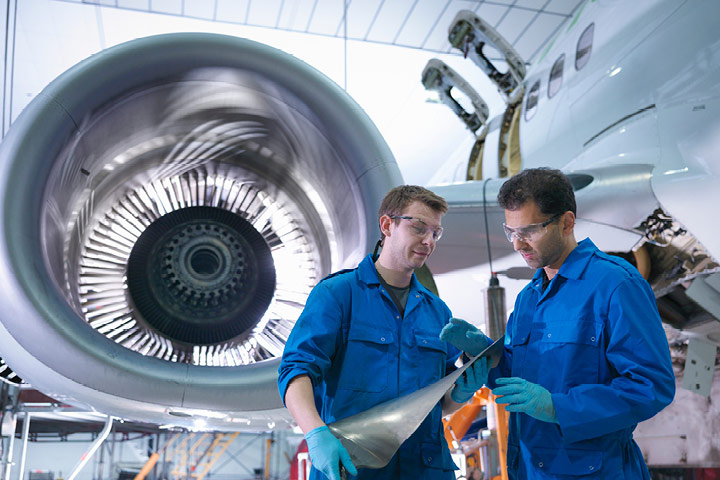Find Your Fit
A simple tool that helps you find the course type suited to your skill and confidence level.

Take the next step in your career as you learn to troubleshoot, problem-solve and repair the mechanical parts of an aircraft. Your specialised skills and knowledge will allow you to supervise a maintenance team to keep planes flying safely.
Through a mixture of theory and practical course work, learn to:
Perform advanced troubleshooting in aircraft mechanical maintenance
Assess structural repair or modification requirements
Plan, implement and supervise civil aircraft maintenance activities
Apply mathematics and physics in aviation maintenance
Process human resources and work health and safety (WHS) admin
Gain practical experience and develop specialist skills that give you an advantage in the job market.
Learn on real aircraft
Weigh aircraft and perform aircraft weight and balance calculations as a result of modifications
Remove and install avionic system components
Perform aircraft flight servicing
Pathway to further study
Eligibility to apply for a Civil Aviation Safety Authority (CASA) B1 Aircraft Maintenance Engineer Licence
This course requires evidence of previous experience or study before you can enrol
Be employed as an apprentice in the industry
Register with an Apprenticeship Connect Australia Provider (ACAP) who will support your application
Non-apprenticeship pathways for trade-related qualifications allow you to have your industry skills assessed through recognition of prior learning (RPL) and undertake gap training to gain a trade qualification. To take this course as a non-apprenticeship, you must:
Be at least 21 years of age, as evidenced by photo identification
Have at least 2 years of work experience in this occupation or trade, as evidenced by employee records such as your resume and/or letters from your employers
Be currently employed in the relevant industry, as evidenced by a letter from your employer
During your study you’ll need to provide your teacher with the following evidence:
To be prepared for this course, we recommend that you have:
Completed Certificate IV in Aeroskills (Mechanical)
An aptitude for practical tasks
Strong spatial awareness and hand-eye coordination
Good written and oral English level
Ability to work well as part of a team
Great interpersonal skills
You take charge of your learning and can finish tasks on time, by yourself.
You can understand technical texts and understand what they mean.
You can write longer paragraphs and texts that explain your ideas clearly.
You can join group talks and share your ideas clearly.
You can solve hard maths problems using different methods
You can use digital tools to do everyday tasks like writing or finding info.
TAFE NSW is committed to meeting the learning needs of every community. Meeting these needs can mean there are additional entry requirements at different campus locations. Check your preferred location for further requirements. If you need help preparing for study, contact us to find out how we can support you.
A simple tool that helps you find the course type suited to your skill and confidence level.
Our graduates go onto roles like: licensed Aircraft Mechanical Engineer (LAME).
Graduates of this course can apply to the Civil Aviation Safety Authority (CASA) for a license to work as a Licensed Aircraft Maintenance Engineer. To work in the industry, you may also need to apply for an Aviation Security Identification Card (ASIC).
Take your study further with other courses offered at TAFE NSW:
Begin here to gain experience and confidence in this study area.
The Diploma of Aeroskills (Mechanical) does not have any pre-requisite courses.
Advance your skills to take your career to the next level
The Diploma of Aeroskills (Mechanical) does not have any post-graduate courses.
Strengthen your expertise and gain specialist skills to expand your employability.
The Diploma of Aeroskills (Mechanical) does not have any related courses.
At TAFE NSW, we recognise your previous study and work experience. You can apply for recognition of prior learning or a credit transfer with any of our courses. If you're successful you'll get your qualification faster.
Courses are made up of a combination of both core and specialty units. In the Diploma of Aeroskills (Mechanical) qualification, you’ll need to successfully complete 43 units of competency, including 28 core and 15 speciality units.
Please note, not all specialty units are offered at every TAFE NSW location. It is highly recommended that you check with your preferred campus for information about the specialty units offered at that location.
Core units are central to the job outcomes of a particular industry or occupation. These are the units industry has agreed are essential to be capable and qualified at a particular study level.
TAFE NSW provides support services across all campus locations and online. Whatever your needs or circumstances, we have the people, resources, counselling and facilities to support you in focusing on your studies.
TAFE NSW Disability Support Service
TAFE NSW Language, Literacy and Numeracy (LLN) support
TAFE NSW Aboriginal Support; Learner support (ABE)
TAFE NSW Careers, Counselling and Pathways Service
TAFE NSW Libraries
Scholarship programs – be supported as you explore your talents and fulfil your potential
Read&Write literacy and study support software is available free for all TAFE NSW students to use while studying on campus and at home
LinkedIn Learning – an online resource which offers innovative courses and tutorials to improve your personal and professional skills
Student associations – get social with our student community